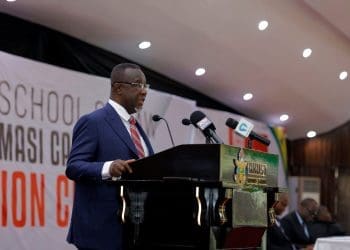Ghana will begin full enforcement of its long-standing marine and aviation insurance laws by the end of this year in a landmark move aimed at keeping millions of dollars in insurance premiums within the country and boosting the capacity of local insurers.
This was disclosed by Stephen Kwarteng Yeboah, Vice-President of the Insurance Brokers Association of Ghana (IBAG), who described the decision as “a major milestone that will change the face of Ghana’s insurance and logistics sectors.”
Mr. Yeboah said the National Insurance Commission (NIC) had already developed a digital system to monitor compliance.
The new platform — known as the Marine and Aviation Insurance Database — will be integrated into the Integrated Customs Management System (ICUMS) of the Ghana Revenue Authority (GRA) to ensure that all goods entering the country are insured locally before clearance at the ports.
“The industry has built the platform, and we are now waiting for GRA’s final confirmation. Once they give the green light, every cargo entering Ghana must have its insurance purchased locally,” Mr. Yeboah said.
“Just like Nigeria, where no cargo leaves the port without local insurance, Ghana is ready to enforce the same.”
The enforcement is expected to begin by December 2025 or January 2026, pending the GRA’s operational approval.
Millions lost to offshore insurers
Mr. Yeboah lamented that, for years, importers have flouted Section 222 of Ghana’s Insurance Act, which mandates that all goods imported into the country must be insured locally.
Instead, many importers continue to buy their marine insurance abroad — a practice that drains Ghana’s foreign exchange reserves and denies local insurers much-needed revenue.
“Every year, millions of dollars that should circulate in Ghana are sent offshore under the guise of marine insurance,” he explained. “Importers pay insurance as part of their invoices from China or India, but when goods arrive damaged, they often get no compensation — because sometimes, no real insurance was ever purchased.”
He added that this loophole has long undermined the local industry’s growth, weakened the cedi, and limited job creation in the financial services sector.
A policy that benefits Ghana
Mr. Yeboah commended the collaboration between the NIC, the Ministry of Finance, and the GRA in agreeing to enforce the law fully, saying the move will have far-reaching benefits for the Ghanaian economy.
He explained that enforcing local marine insurance will reduce pressure on the cedi, create employment, and build stronger, better-capitalised insurance companies.
“When importers buy insurance locally, they pay less foreign currency abroad,” he said.
“If an importer previously paid $1 million for cost, freight, and insurance, they may now pay $800,000 overseas and pay the remaining insurance premium in Ghana. That keeps money in our economy and strengthens our currency.”
According to Mr. Yeboah, any claims arising from damage to goods during shipping will now be settled locally — ensuring accountability and timely compensation.
Transition to Free on Board (FOB) contracts
The IBAG Vice-President explained that enforcement will also require importers to shift from Cost, Insurance, and Freight (CIF) contracts to Free on Board (FOB) terms.
Under FOB, the responsibility for insuring goods shifts to the Ghanaian importer, who must purchase insurance locally.
“Once enforcement begins, offshore insurance certificates will no longer be accepted. Goods arriving without valid local insurance will be considered uninsured, and importers will have to purchase Ghanaian policies before clearing their cargo,” he said.
Why enforcement matters
Mr. Yeboah emphasised that the policy is not merely a legal requirement but a strategic economic reform that will significantly enhance local industry capacity.
“Insurance thrives on volume. When we retain premiums locally, our companies grow stronger, can underwrite bigger risks, and employ more Ghanaians,” he said. “This is how we build resilience in the financial system and reduce dependence on foreign reinsurers.”
He noted that the enforcement will also improve liquidity within the local market, allowing insurers to support larger infrastructure and business projects.
Other compulsory insurance policies
Mr. Yeboah also used the opportunity to remind the public of other compulsory insurance requirements under Act 1061.
These include Public Liability Insurance, required for businesses such as filling stations, hotels, and public event venues; Professional Indemnity Insurance, mandatory for doctors, accountants, and lawyers; Motor Third-Party Liability Insurance, to protect accident victims; and Commercial Property Insurance, covering fire, floods, and structural damage to commercial buildings.
He said recent regulations, including L.I. 2488, now empower agencies like the Petroleum Commission, Ghana Tourism Authority, and professional associations to ensure their members comply with these laws before granting licenses.
Raising awareness and building trust
The IBAG Vice-President noted that while Ghanaians are familiar with motor insurance, awareness of other forms — such as marine, professional, and property insurance — remains low.
“We are intensifying public education to help people understand that insurance is not a luxury; it’s a safety net,” he said.
“If you receive poor professional service, suffer property loss, or face business interruption, insurance ensures you are compensated.”
Encouraging personal and family insurance
Mr. Yeboah also appealed to Ghanaians to adopt a personal insurance culture, including life, health, and funeral policies, to secure their families’ financial future.
“Too many families collapse financially when a breadwinner dies,” he said. “
A simple life or funeral policy can keep children in school and help families survive difficult times. That is how we build financial security.”
A turning point for Ghana’s insurance sector
According to Mr. Yeboah, the imminent enforcement of marine and aviation insurance marks a turning point in Ghana’s financial sector reform.
The initiative will channel hundreds of millions of dollars back into the local economy, empower insurers, and stabilise the cedi.
“This policy is about keeping Ghana’s money in Ghana,” he declared.
“When we retain our premiums, we build capacity, protect businesses, and make our economy stronger. It’s a win for everyone — government, insurers, and the Ghanaian people.”












